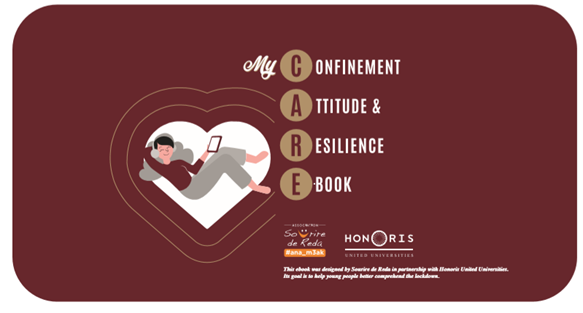
Introduction
The COVID-19 pandemic has had a clear impact on the mental wellbeing of the population. The household survey conducted by the High Commission “Haut Commissariat Au Plan” in April has shown high rates of fear and anxiety in the population while under lockdown and confinement. Notably, urban areas were twice as affected as rural households.
Given the global and national priority to respond to the pandemic, and the mobility restrictions due to lockdowns, health services were undermined. This meant that management of noncommunicable diseases and mental health conditions was also affected, so were rehabilitation and social services for these conditions.
In response to this situation, many initiatives and efforts were undertaken by the Ministry of Health, and other actors (nongovernmental organizations, professional associations, university hospitals, private sector, “Fondation Mohammed V", Global Fund) to ensure the provision of psychosocial support to the general population and vulnerable groups.
Hotlines and remote services
A helpline was launched by the Moroccan Society of Clinical Psychologists, the Collective of Practical Psychologists of Morocco, and the Moroccan Association of Child and Adolescent Psychology. The helpline offers support to doctors, paramedics, patients with COVID-19 and their families, as well as people affected by confinement.
The Moroccan Association of Addictology launched a hotline providing medical and psychological assistance to people using substances and their families. This hotline (+212 660 635 816) was initiated on 6 April. It is manned by 10 volunteer doctors, who are members of the Moroccan Association of Addictology.
The Moroccan Psychiatric Association launched a helpline (+212 639 099 552) for people suffering from psychological distress, including people with mental disorders.
A dedicated helpline (+212 605 093 728) was set up by the National Federation for Mental Health to support people with mental disorders and their families. The hotline is run by 11 psychiatrists, seven psychologists and seven facilitators, who are trained on the referral psychoeducational programme for people with mental disorders and their families.
The Peer Helpers Association for Psychosocial Rehabilitation and AFAK Association in Casablanca created a virtual system to operate the medico-psychosocial centre remotely. They provided teleconsultations, and support through groups, peers, and social media networks.
The Medico-psychological Support Unit was created in Ibn Sina University Hospital (Rabat-Sale) to provide support for health workers and patients in COVID-19 hospital units, and patients quarantined in hotels (teleconsultations and liaison psychiatry services).
Another helpline supported by Ibn Rochd University Hospital and WHO Collaborating Center in Casablanca was set up to support healthcare workers. It was initiated on 30 March. The helpline offers psychological counselling and psychiatric consultations. A team of 20 psychiatrists (including those in training) are running this service.
The Faculty of Medicine and Pharmacy of Casablanca, the League for Mental Health and WHO Collaborating Center in Casablanca set up a dedicated helpline for medical students. The helpline is run by two trainee psychiatrists offering psychological support as well as psychiatric consultations.
The Psychiatric Hospital of the University Centre of Marrakech is running three types of helplines. The first helpline aims to provide support to patients hospitalized in the Errazi Hospital of Mohammed VI University Hospital who are either suspected of or tested positive for COVID-19. The second helpline is dedicated to the staff of the Mohammed VI University Hospital, while the third helpline provides support to children and their parents.
The University Psychiatric Hospital of Fes created a specialized inpatient unit for psychiatric patients affected by COVID – 19.
Another helpline was supported by Chourouk Association in Oujda, and provides psychosocial support for people suffering from psychological distress.
Education, awareness and mental health promotion
Distance psychoeducation for families of COVID-19 patients was provided by a number of nongovernmental organizations – the Association Chams (Marrakech), Sila (Sale), and Users of Psychiatry Association (Casablanca).
The Mental Health Office at the Ministry of Health developed and disseminated information and educational materials targeting specific groups, including children and adolescents, health professionals, and older persons.
Several educational videos on mental health-related topics were broadcast on TV and social media.
An e-book was developed for children and young people to help them understand their emotions better during confinement, and to give them practical tips for better everyday life. The e-book is available in three languages – Arabic, French and English.
Continuity of services
A psychiatric hospital unit was established to treat patients with psychiatric disorders diagnosed with COVID-19. Liaison psychiatry services are being offered to patients admitted to general hospitals that are living with mental health disorders (distress and mild to moderate mental disorders) and were affected by the COVID-19 pandemic.
With the support of the Global Fund, addictology centres reorganized their work and visitation schedules to ensure continuity of harm reduction services during the COVID-19 pandemic. These services include consultations, medicines (methadone), and prevention materials. Also with the support of the Global Fund, teleconsultations were made available, and an application “Google Meet” was used to enhance coordination with local teams.
Lessons learnt and way forward
Collaboration between state and non-state actors has shown that it is possible to maintain and scale-up mental health services and care during the COVID-19 pandemic. The services currently available in Morocco should be strengthened further to support emerging and growing needs during this pandemic, and in the long run. Investments in innovations should also continue and be increased. For example, there is a need for further investments in virtual care platforms to be used for psychoeducation and telepsychiatry, as well as e-therapies (self-guided, and supported by peers and specialists). Such innovations should occur in the context of integrated electronic health records and platforms, and their impact should be systematically evaluated.


